2022 highlights
Thousands of young people aged 8 to 18 from all over the world took part in do your :bit 2022. They came up with amazing, innovative solutions that worked towards the Global Goals and solved problems facing the world.
Our judges chose winners from six global regions - Africa, Asia & Pacific, Europe, Latin America, Middle East and North America - in the three challenge categories. Find out about the winners, runners up and their entries below.
8-14 year olds, micro:bit solutions
Young people were challenged to design and make a solution using the micro:bit in this category.
Africa
Tunisia
Jasser, Oussema and Iskander’s designed a smart home to help people live comfortably and sustainably. It features an alarm, lighting system, gas leak detector, temperature monitor and renewable energy system.
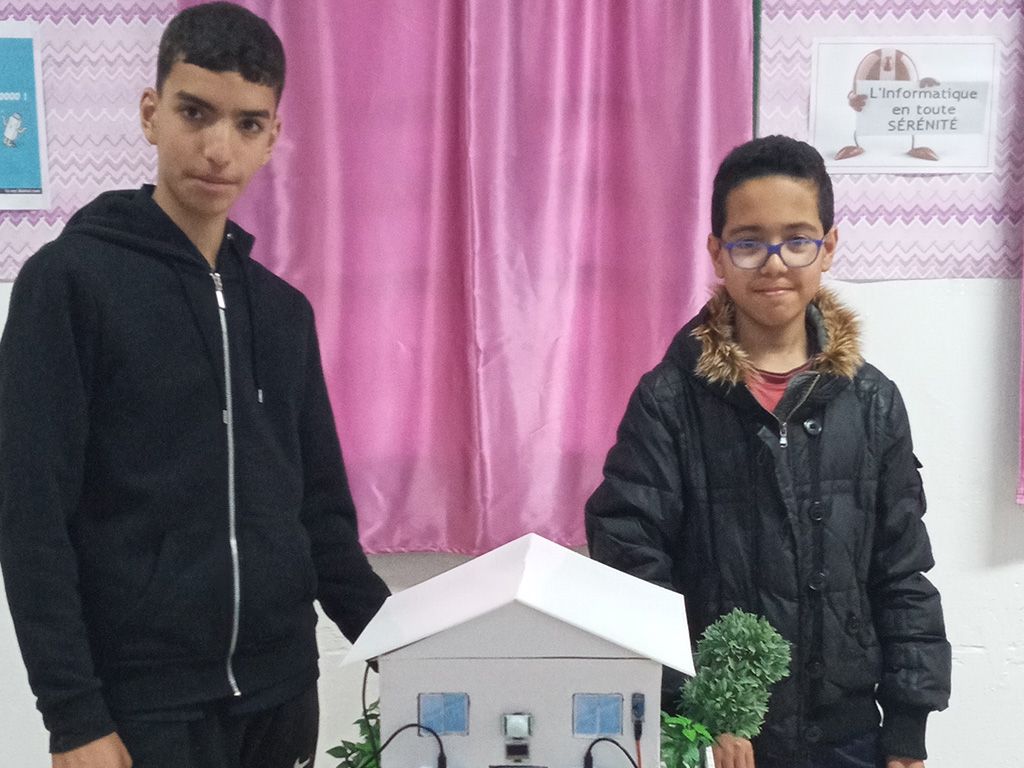
The team display their smart home.
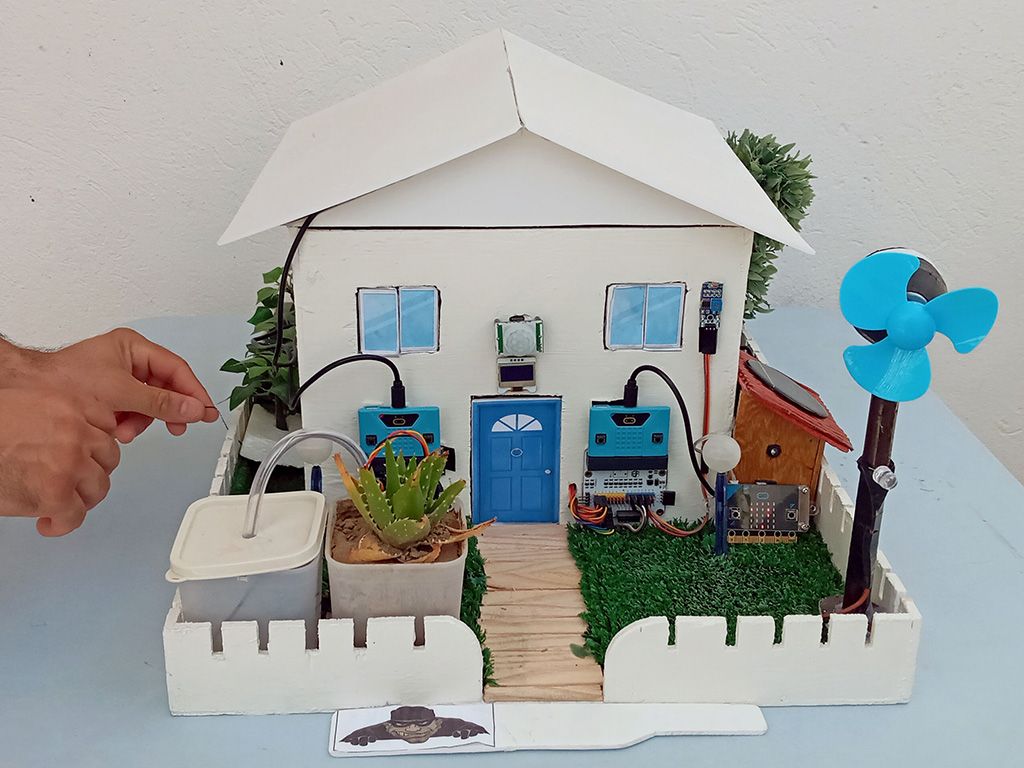
The smart home prototype
Asia and Pacific
Malaysia
Jared invented ‘e-mom’, a smart device to assist in monitoring and maintaining good posture and practice when learning online. The ‘e-mom’ tells children to maintain a reasonable distance between their eyes and the computer screen, monitors ambient lighting in the study room and, is equipped with a timer to remind children to have short breaks and drink water!
Jared said, "I found that with a creative and innovative mind, I could come out with a simple yet practical solution."
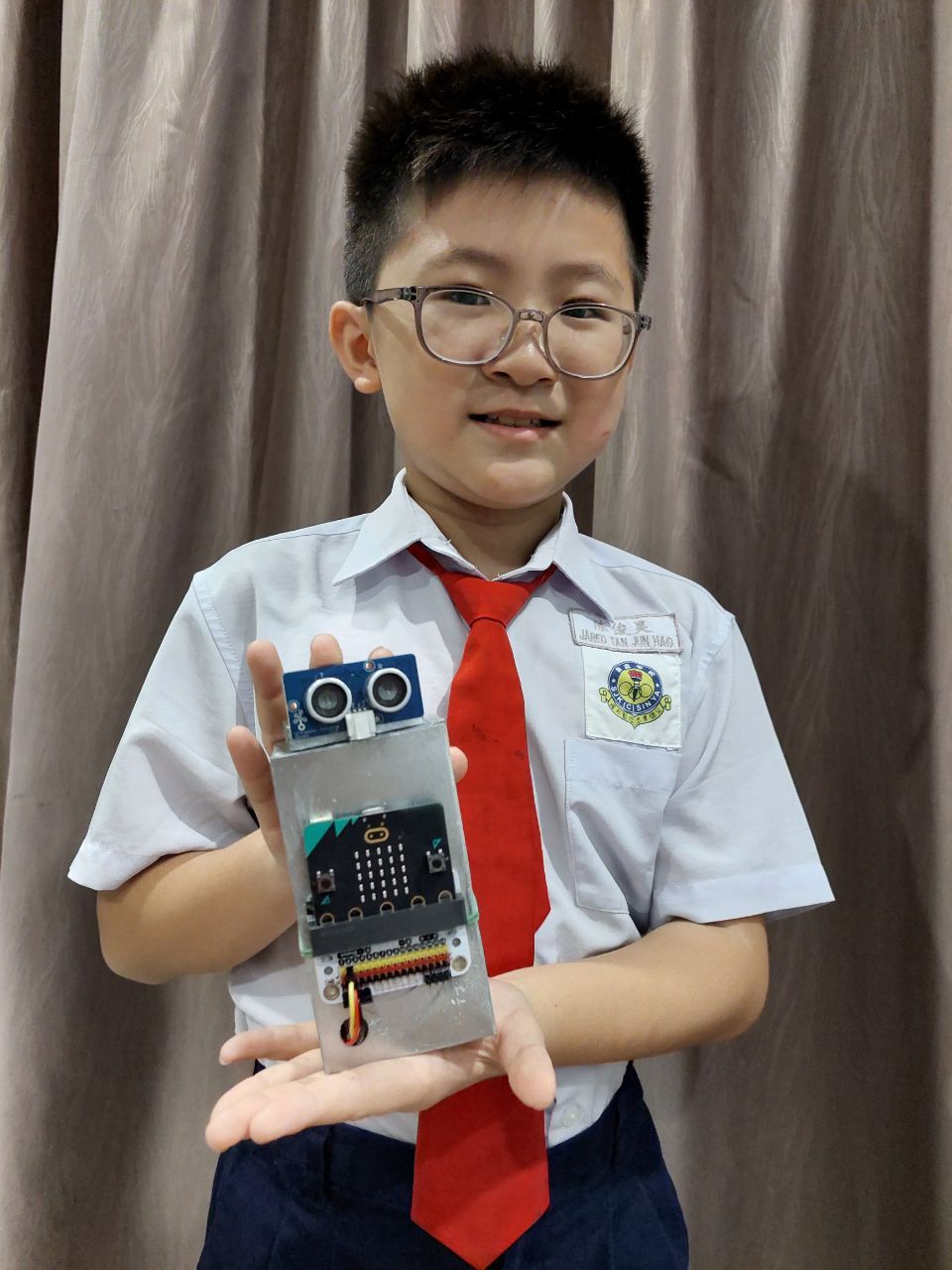
Jared demonstrating his ‘e-mom’, a smart device to assist students.
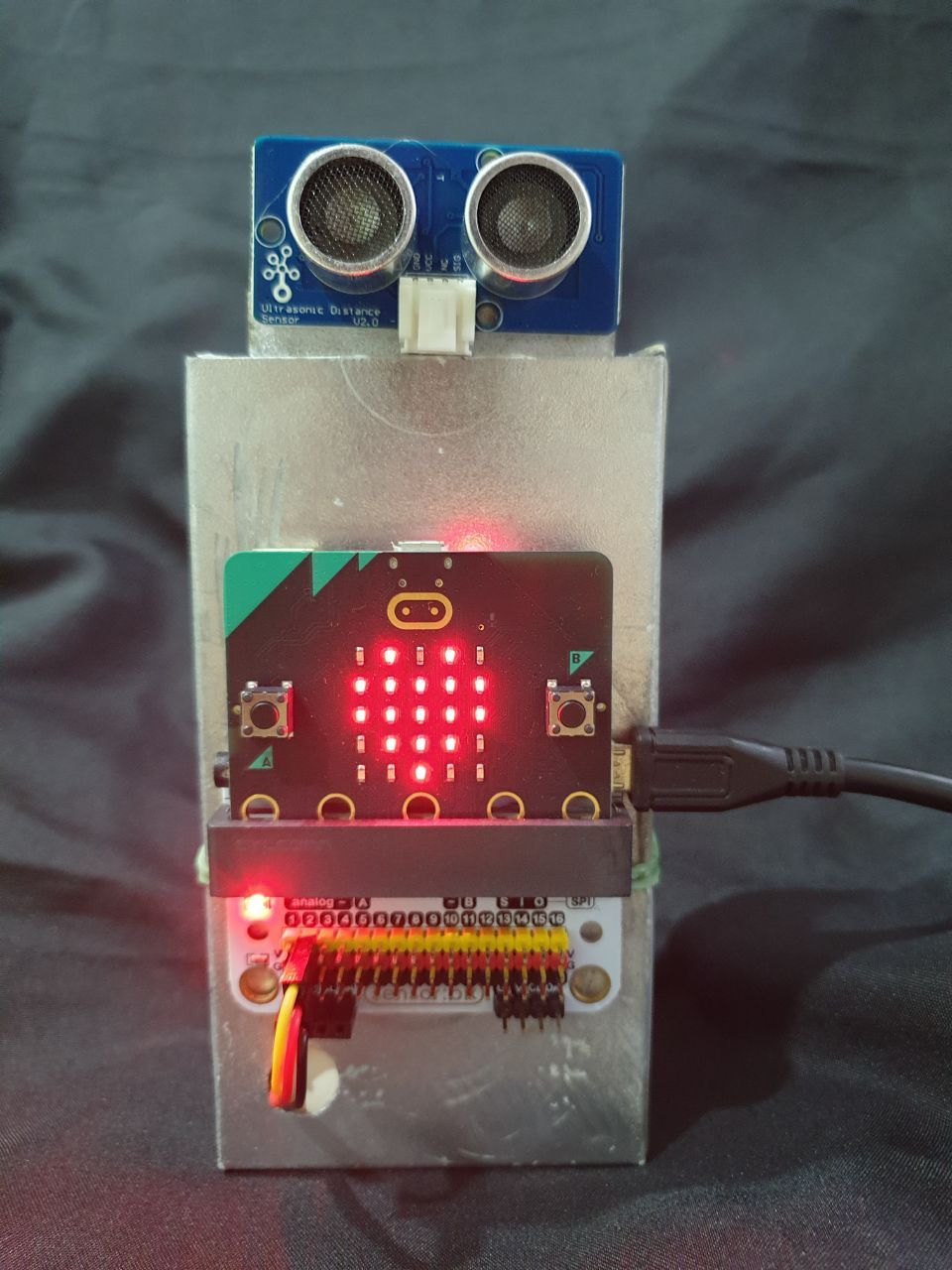
'e-mom' in action.
Europe
Bosnia and Herzegovina
Ahmed's creation is a fire sensor alarm that helps to extinguish fires using renewable energy. A water mill provides energy to control a micro:bit that in turns sets off a water pump if a fire is detected by the sensors.
Ahmed said, "I chose this project because I know how dangerous fires are for the environment, the human community and especially for animals."
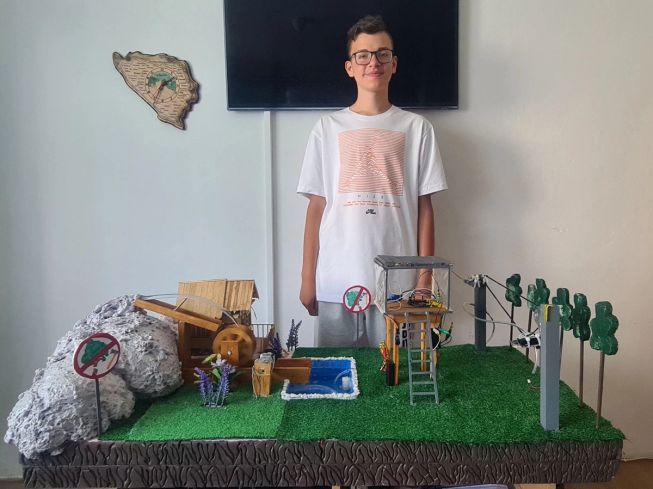
Ahmed with his creation, the fire sensor alarm.
Latin America
Uruguay
Juan was motivated to create the 'early detection system for wildfires' after a large forest fire in Uruguay. The system uses micro:bit sensors to monitor temperature and humidity and alert firefighters when necessary. Juan wanted to create the device to avoid the destruction of eco-systems.
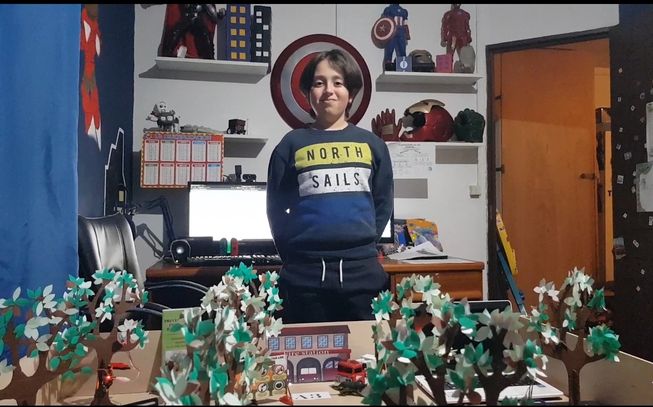
Juan shows us his early fire detection creation.
Middle East
Saudi Arabia
Zayd’s ‘Electricity Generated Running Track’ turns energy from walking or running in to electricity. Zayd wanted to create a device that not only prevents us from burning fossil fuels, but also encourages people to lead a healthier lifestyle.
In the future Zayd would like to be a mechatronics engineer. He said, "I want to create more inventions like this that would help the world."
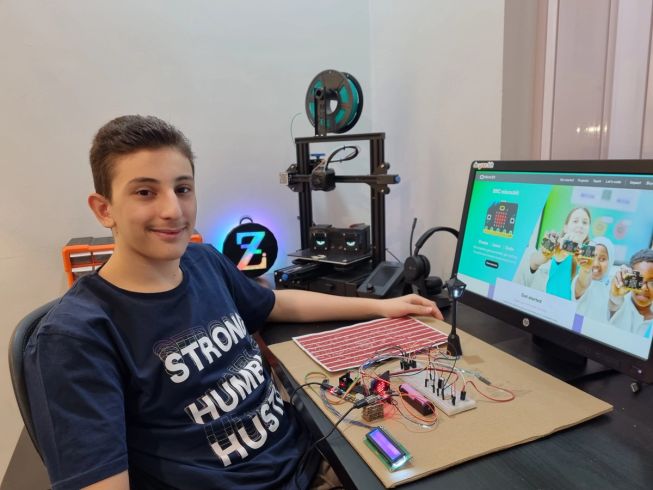
Zayd with his ‘Electricity Generated Running Track' prototype.
North America
USA
Isla’s TASC (Teacher and Student Communication) allows teachers and students to communicate in class using the micro:bit radio function. Isla wanted to create a solution that allowed students who might be shy or need additional help to get support without being embarrassed to ask.
Isla said, "It feels incredible to have won this challenge during my first few months of using the micro:bit."
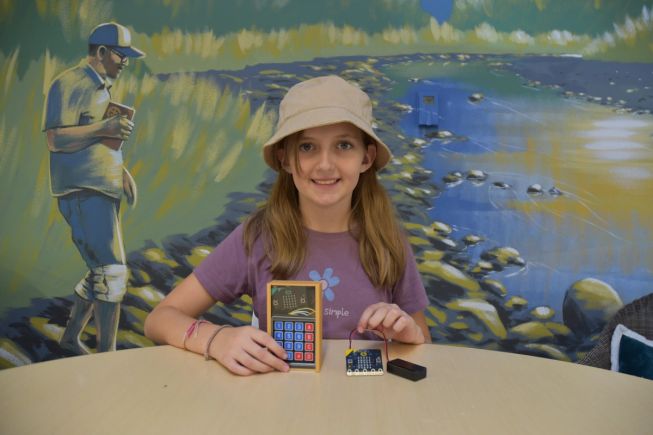
Isla shows us her Teacher and Student Communication (TASC) device.
8-14 year olds, paper prototypes
In this category, we asked young people to create a paper prototype to explain their idea.
Africa
Tunisia
Oussema noted that climate change may increase the number of avalanche accidents in mountainous regions of the world. His ‘AV Detector’ detects avalanches and alerts the authorities to evacuate villagers that might be affected. It can also be used to locate hikers and climbers who may be in danger.
Oussema said, "We can always help to solve life problems with innovative ideas and appropriate technology."
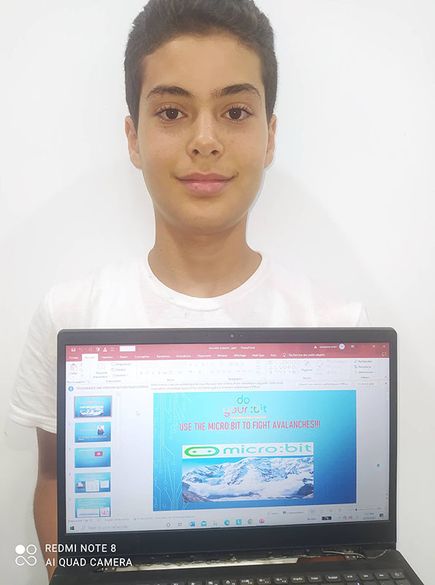
Oussema's design for his AV detector.
Asia and Pacific
Taiwan
Jing Yan thought about many issues facing farmers when creating his ‘Smart Farming Helper’. The device uses chilli water to water and maintain farmland and also get rid of unwanted pests that are ruining the crops. Jing Yan thought his entry would support farmers to develop sustainable agricultural methods.
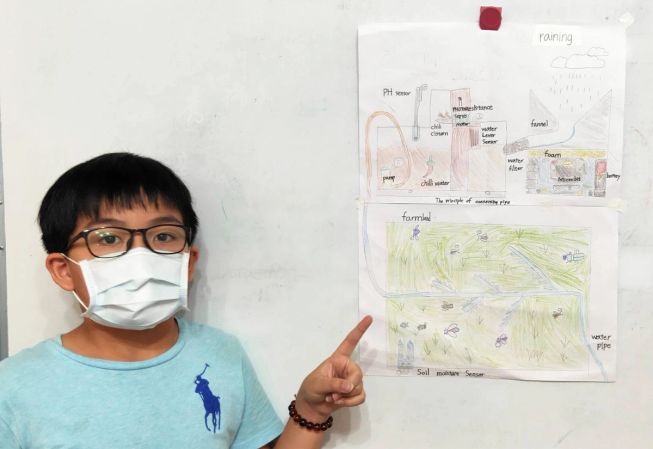
Jing Yan displays his 'Smart Farming Helper' design.
Europe
United Kingdom
Molly-Rosanna created the ‘Help A:bit’, a wearable device designed to help keep people stay safe on the street. It’s a safety device that connects to your mobile via Bluetooth and can track locations, call emergency services, and notify emergency contacts at the push of a button. Molly-Rosanna designed the device to help women feel safe and protected when walking alone.
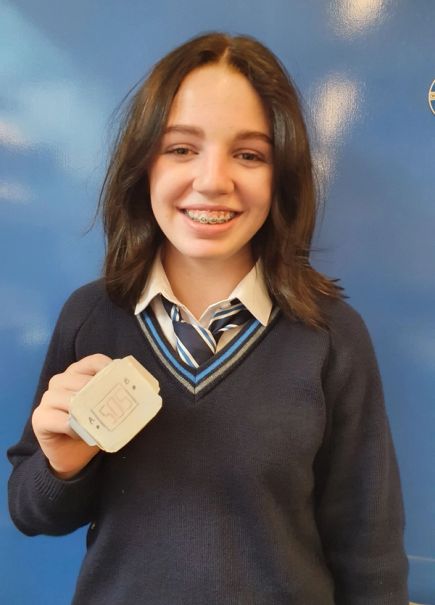
Molly-Rosanna shows a model of the 'Help A:bit' device she created.
Latin America
Brazil
Vinicius and Antonio’s ‘Project ACVM’ aims to reduce the excess of carbon dioxide in the atmosphere. It uses a CO2 meter to detect the amount of gas in the air and sends this information to the micro:bit to calculate how many trees and plants will be needed to remove that CO2 from the air.
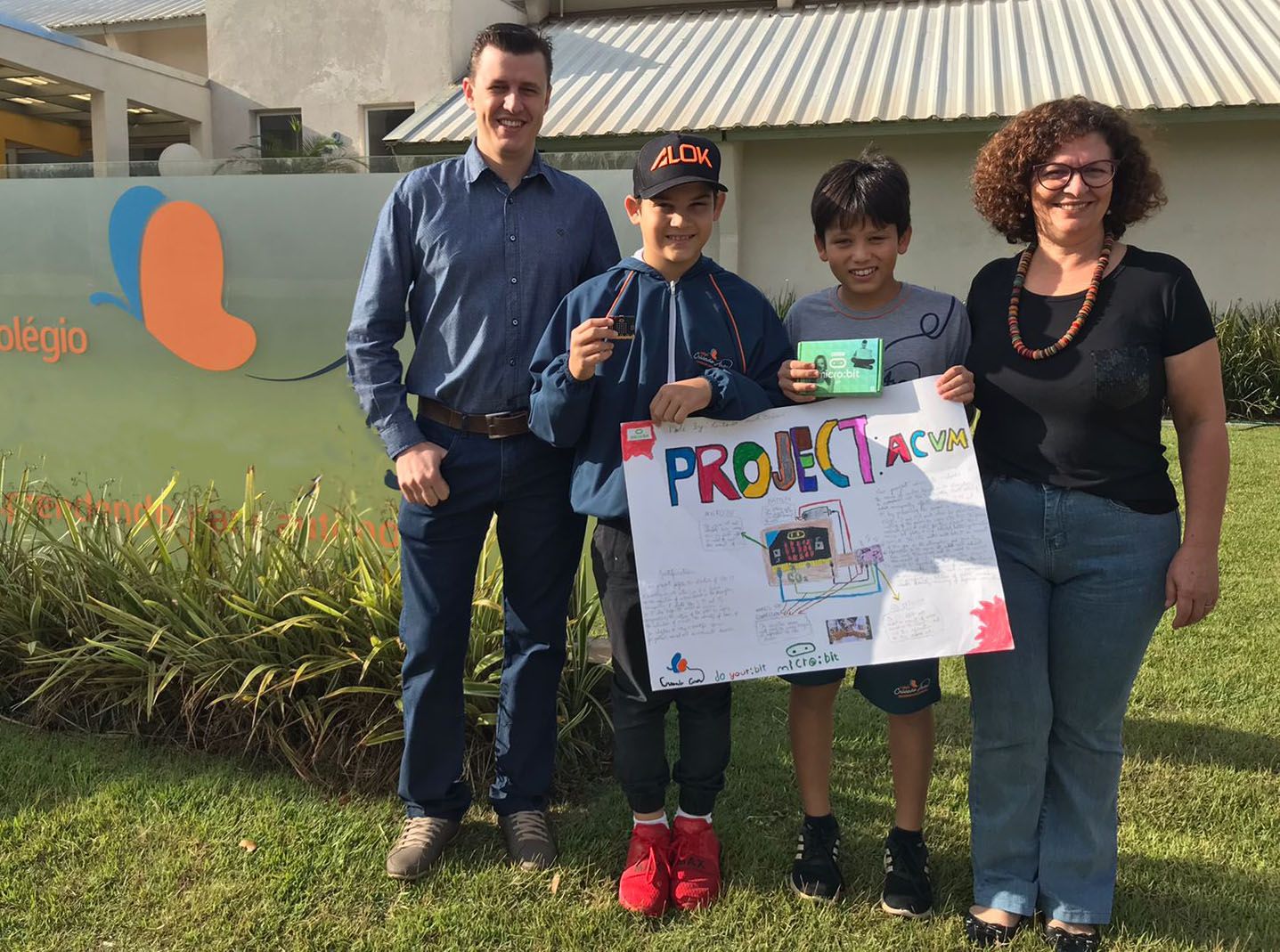
Vinicius, Antonio and their teachers display their entry.
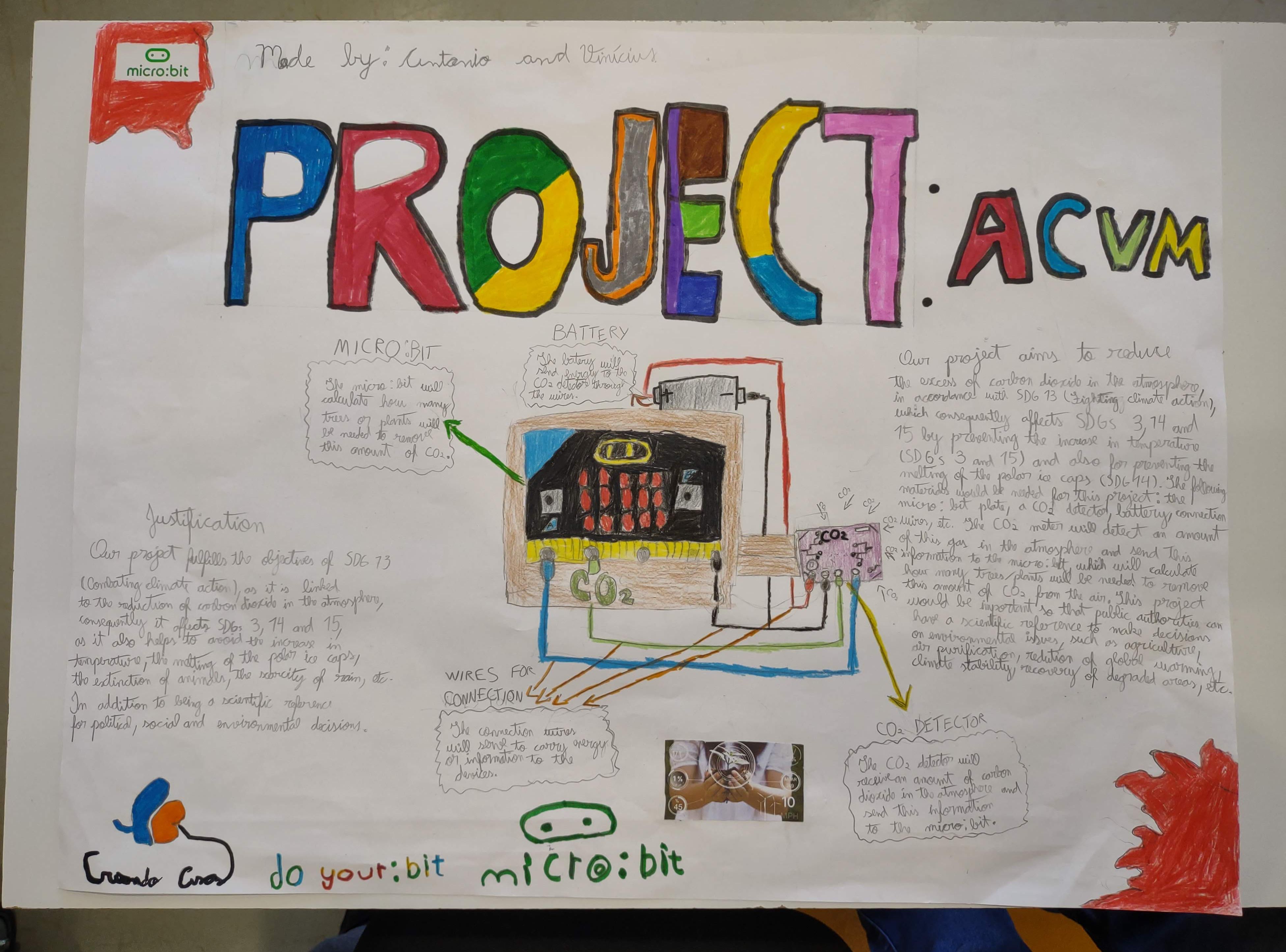
Vinicius and Antonio's illustration of their micro:bit design.
Middle East
Turkey
Alper created the ‘Deaf:bit’, an invention to support hearing impaired individuals live independently.
He said, "My friend's family is deaf. I saw the problem they were having and I wanted to develop a prototype for them. I thought how can I come up with a simple solution. When my teacher introduced micro:bit V2 features, I figured out how to do it."
The device is worn as a wristband and uses multiple micro:bits to give warnings in various situations such as when the house bell rings, a baby cries or a horn is sounded.
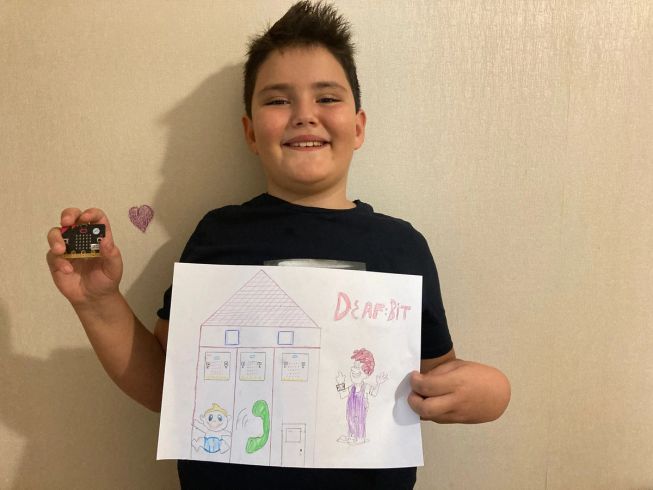
Alper and his winning 'Deaf:bit' design.
15-18 year olds, micro:bit solution
15-18 year olds were challenged to design and make a solution using the micro:bit.
Africa
Kenya
Shanice created the ‘Balanced Diet Finder’ to help her community plan balanced meals that are healthy and nutritious. The solution, developed using AI and micro:bit, classifies food into food groups and supports the user to make healthy choices.
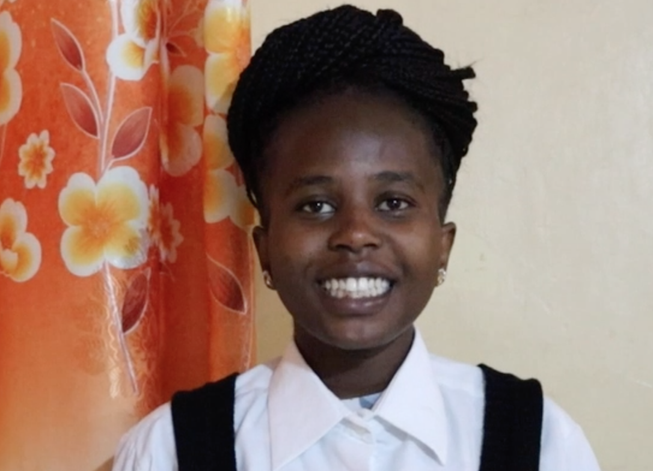
Shanice, the do your :bit winner from Kenya.
Asia and Pacific
Vietnam
Dang, Nguyen and Bui devised the ‘Healthcare Support System for the Elderly’. The system includes sensors to measure the health and environment of the user which can then be accessed by doctors or family. The system also features an automatic mechanism to dispense the correct dosage of medication at the correct time for the user.
The students said about their winning entry, "It will create a strong motivation for us to be more passionate about technology and computer science and encourage us to become programmers in the future."
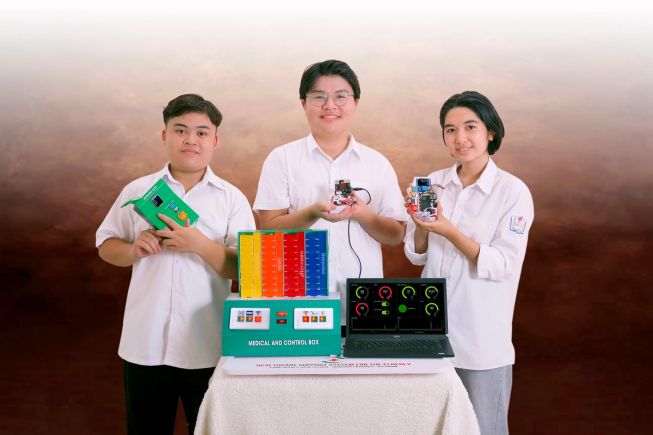
Dang, Nguyen and Bui display their micro:bit healthcare system.
Malaysia
Fatin, Wan and Ahmad created ‘Animal Foresee’ to try and reduce the amount of animals that are killed crossing roads. In their country, Malaysia, they are trying to protect elephants but they noted the device could be used to detect many types of wildlife, including tigers, elk and foxes. The device uses the micro:bit accelerometer to detect elephants near a road and the radio function to alert drivers.
The team said, "Taking part in the do your: bit challenge has inspired us to seek out problems in our world and try to find a way of solving them using technology."
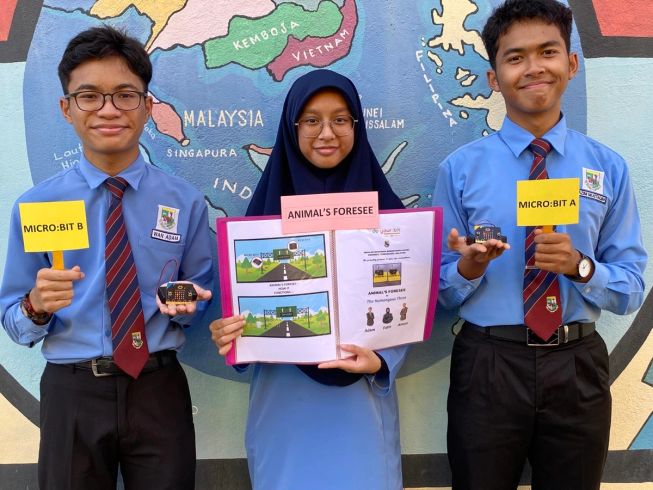
Fatin, Wan and Ahmad present their entry, 'Animal Foresee'.
Europe
Hungary
Qingzhe designed the ‘Time Keeper’ to protect animals from being involved in rail accidents. The device detects and times incoming trains and then uses sound to chase away animals who may be in danger.
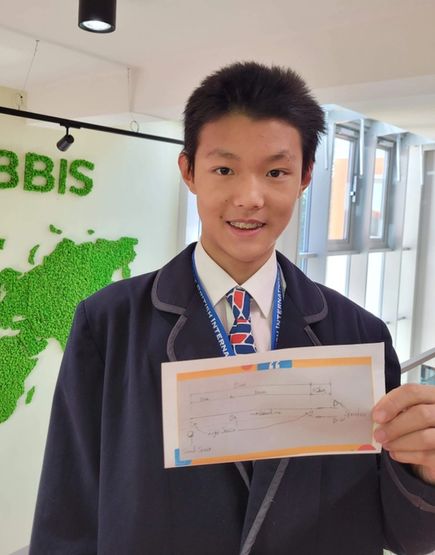
Qingzhe Jacob Zhang presents his design for the 'Time Keeper' creation.
Latin America
Columbia
Mario and Daniel's ‘Intelligent Irrigation’ system aims to use resources, such as water, fertiliser and energy, efficiently. It uses the micro:bit and a humidity sensor to monitor conditions and a water pump to create a fully automated garden. The team said their project goal was to "use technology to serve nature and care for the environment".
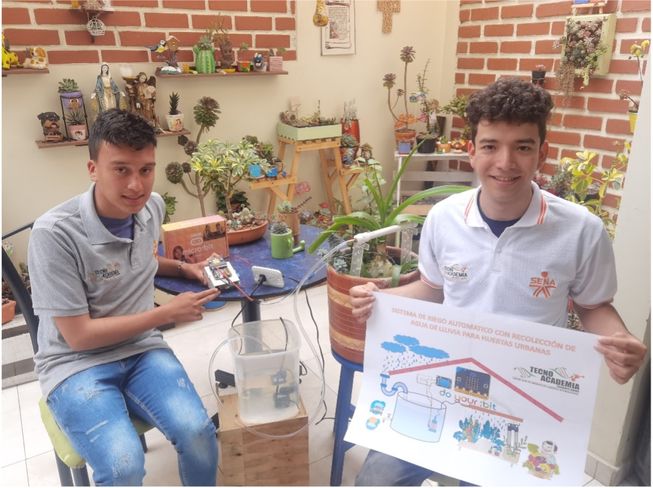
Mario and Daniel with the design and prototype of the ‘Intelligent Irrigation’ system.
Middle East
Lebanon
Ali designed the ‘Room Monitoring System’ to create healthy spaces to live and socialise in. The system uses micro:bit to monitor the levels of humidity, temperature, and smoke in a room. It alerts users if action is needed, such as increased ventilation, to create a healthy environment.
Ali said about taking part in do your :bit, "This experience taught me to never give up, even if the problem seems to be unsolvable."
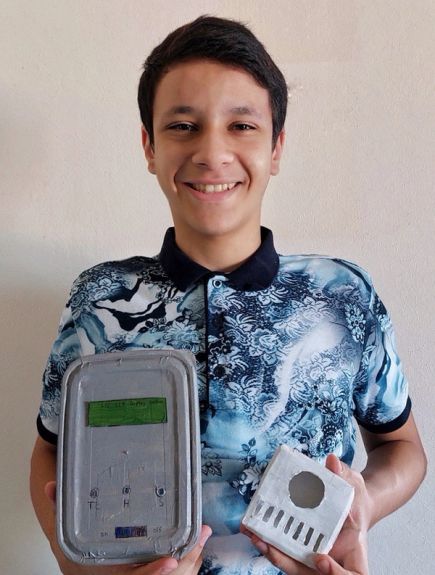
Ali with his model of the 'Room Monitoring System'.
North America
USA
Dawsen and Matson created the ‘Fire Assistance for Places of Risk’ to protect ecosystems at risk of wildfires. The FAPR is a temperature sensing, fire detecting, and soil measuring device that can be strapped to a tree or placed in the soil to help prevent major fires. The solution uses the micro:bit sensors and LEDs to display monitoring data.
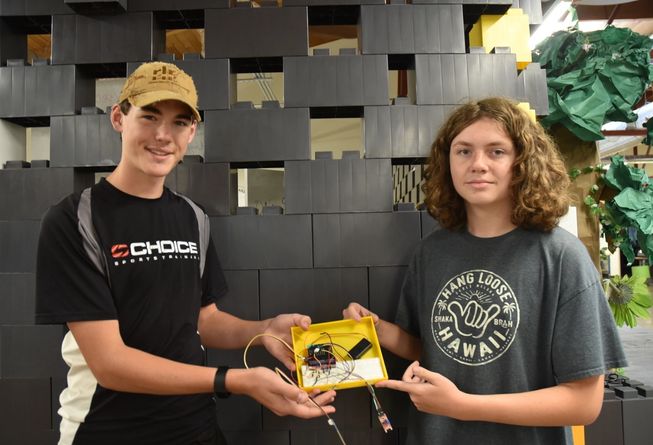
Dawsen and Mason with their FAPR device.
Runners up
8-14 years old, micro:bit solution category
Africa
Mariem, Alaa and Mohamed, Tunisia - a sea turtle incubator that controls the temperature of the sand to help protect sea turtles and determine the gender of newborns.
Balkis, Tunisia - the ‘Smart Puppet’ helps teachers communicate with autistic students.
Asia and Pacific
Yuuka, Akari and Lila, Japan - ‘Watey’ is an app to help families save water in the shower.
Zi, China - a bionic arm to support people with hand disabilities carry out tasks.
Europe
Kriton, Giorgos and Kuriakos, Greece - a device that detects if water bottles have been exposed to the sun too long, potentially causing the chemicals from the bottle to contaminate the water.
Bozica and Andrej, Macedonia - a boat that can collect toxic spills.
Latin America
Sara, Sebastian and Mariana, Colombia - project that recycles used cooking oil into a renewable fuel.
Michelle and Johan, Colombia - an intelligent waste sorting and storage system.
David, Peru - the ‘Hexagon Breathing Box’ teaches people a breathing technique to reduce stress.
Middle East
Mustafa, Iraq - ‘Happy Date Palms’ helps farmers increase the productivity of date trees growing in Iraq.
Cybelle and Joury, Lebanon - the food expiry date tracker helps prevent food waste.
North America
Heritage Engineers, USA - the ‘Micro Band’ is worn by lumberjacks to prevent them cutting down too many trees and contributing to deforestation.
Olivia and Lucy, USA - the ‘Overfishing Weight Detector 3000’ weighs the amount of fish on a boat to prevent overfishing.
8-14 years old, paper prototype category
Africa
Ahmed, Tunisia - the ‘bit:care’ will help alzheimer's patients in their daily life.
Douaa, Rimes and Ikram, Tunisia - a robot scarecrow that uses sensors to protect crops and gardens.
Asia and Pacific
Eunji and Nakyung, South Korea - a device that monitors and manages the population of stray cats in residential areas.
Alessio, Adrian and Ronan - the ‘Green Life 7000’, a robot that plants new trees.
Europe
Ayla and Amelie, UK - the ‘Help-o-meter’ allows homeless people to access support discreetly.
Chloe and Lexie, UK - the ‘Smiley-bit’ sends positive messages via the micro:bit to support people’s mental health.
Latin America
Anahy and Samyra, Brazil - a sound meter that monitors noise levels in schools.
15-18 years old, micro:bit solution
Africa
Mohamed and Iyed, Tunisia - ‘Temp-reg’ allows uses to set the correct temp in a fridge for storing medicines.
Taha and Amine, Tunisia - a device that detects gas leaks and smoke in the home and alerts families to any danger.
Asia and Pacific
Ain, Nik and Ahmad, Malaysia - a bad posture detector to encourage users to practice good posture.
Rio and Chihiro, Japan - a power saving system to monitor light use in a family home.
Latin America
Christopher, Peru - the ‘Parental Control’ controls children’s use of screens when their parents are away.
Middle East
Husain and Sideka, Iraq - a smart Automated Hydroponics System created to minimise human interference
North America
Samantha, USA - ‘Food for all’ helps food banks to monitor their stock to ensure they can always distribute food to those in need.
Shayyan, Charlotte and Udichi, Canada - ‘Micro:BITE’ helps users monitor expiry dates on food packaging to limit food waste.
Special mentions
Europe
The judges gave a special mention to Joel, Ryan and Wajih from Ireland for their entry, 'Climate Chaser'. Their creation is a system that captures CO2 from the air and feeds it to algae and other sea plants that use the CO2 to photosynthesize and create oxygen.
The judges wanted to acknowledge Joel, Ryan and Wajih’s entry and the value of thinking differently about climate change. The judges felt the team displayed real creativity in the research and design of their solution and original thinking about combating climate change.
Middle East
The judges also gave a special mention to Ranim, Hala and Maha from Lebanon for their entry, ‘Microps’. Their creation is designed to save crops from being destroyed by hurricanes and tornados.
The judges wanted to acknowledge the value of thinking of ‘out of the box’ solutions to tackle real-world problems. The judges felt Ranim, Hala and Maha displayed originality and creativity in how they used the microbit to develop their solution.